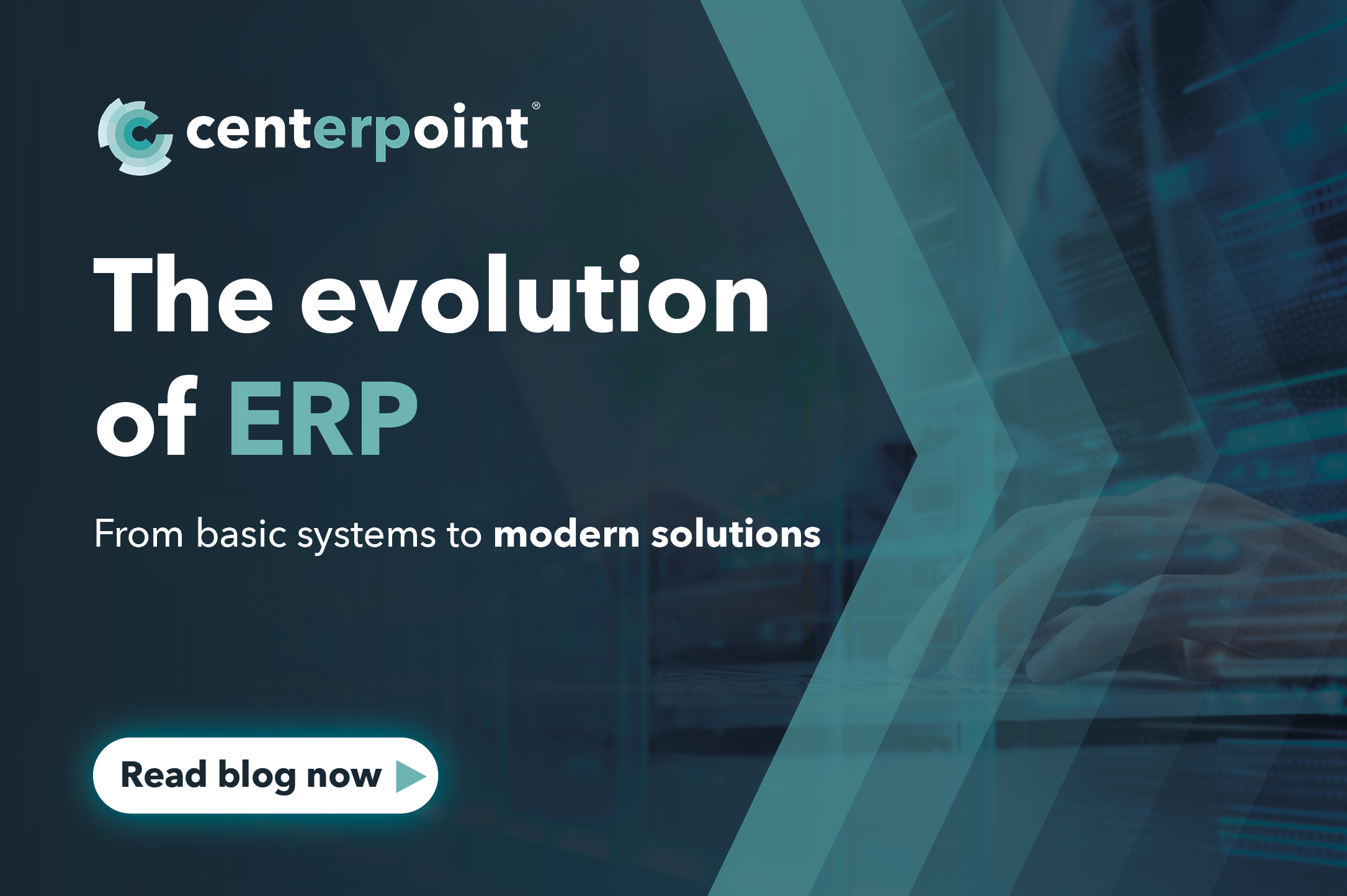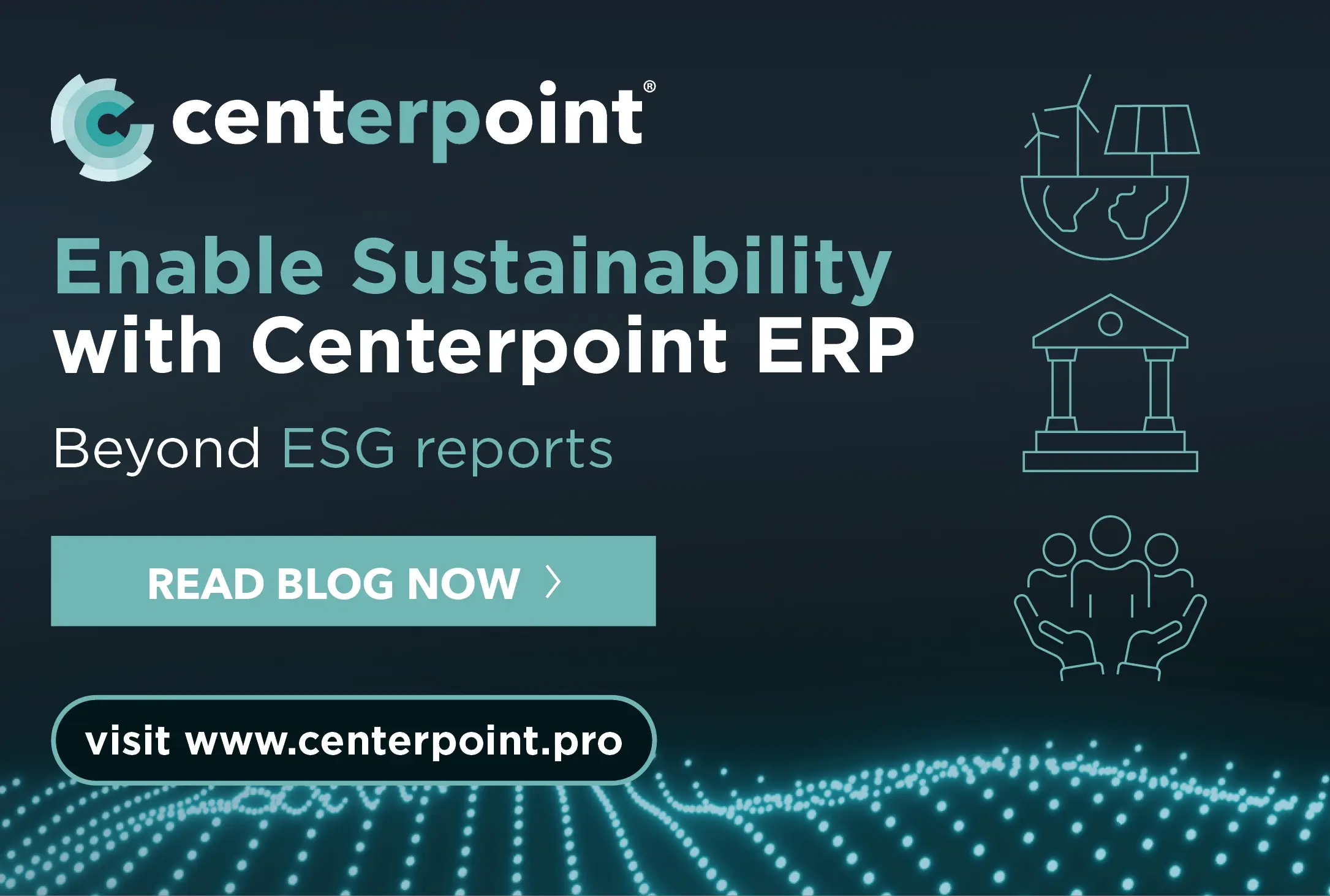In the wake of unprecedented climate challenges and a global call for sustainable practices, 2024 emerges as an important year for businesses to re-evaluate their environmental, social, and governance (ESG) strategies. With landmark regulations like the EU's Corporate Sustainability Reporting Directive (CSRD) and the Global Plastics Treaty on the horizon, companies are under increasing pressure to align with these standards.
This blog explores how Centerpoint ERP serves as a linchpin for organisations aiming to stay compliant amidst the dynamic shifts in ESG and sustainability in 2024.
EU’s Corporate Sustainability Reporting Directive (CSRD):
The CSRD mandates large companies to report on their climate impact, setting new standards for non-financial reporting. It came into effect in January 2024 and represents a significant expansion of mandatory sustainability reporting. With an estimated 50,000 companies who will likely have to comply with these new CSRD reporting requirements, it is imperative to take action now to avoid scrambling to comply.
• Centerpoint ERP ensures seamless data collection and reporting, with a single source of truth for your business, the ERP system can consolidate data from across your organisation, including data such as; waste generation, energy consumption, emissions and sustainability metrics. Ultimately, Centerpoint can help companies meet CSRD requirements while fostering a strategic integration of sustainability into their core business models.
SEC’s Climate Disclosure Rules:
Expected in April, the U.S. Securities and Exchange Commission (SEC's) rules require US public companies to disclose climate-related information. This encompasses a spectrum of information, such as greenhouse gas emissions, anticipated climate risks, and plans for transitioning. Rooted in the TCFD framework, these suggestions aim to provide investors with uniform, comparable, and valuable data to facilitate informed investment choices, while also establishing coherent and transparent reporting responsibilities for companies.
• Centerpoint ERP facilitates tech-enabled reporting, aiding businesses in efficiently disclosing information such as greenhouse gas emissions and complying with SEC regulations. An ERP can act as the centre of your sustainability management and accelerate our journey to a more sustainable future.
California’s Climate Corporate Data Accountability Act (SB253):
California has passed two new laws requiring businesses with over $1 billion in global revenue to disclose (and verify) their carbon emissions and climate-related financial risks for 2025 by the end of 2024.
• Centerpoint ERP can generate automated reports for emissions, making it easier to compile the necessary data for regulatory reporting and ensuring compliance with SB253 and SB261. You can ensure that your reporting is aligned with the specific requirements of environmental legislation.
Global Plastics Treaty:
In March 2022, Heads of State, Ministers of environment and other representatives from UN Member States endorsed a historic resolution at the UN Environment Assembly (UNEA-5) in Nairobi to End Plastic Pollution and forge an international legally binding agreement by 2024. The resolution addresses the full lifecycle of plastic, including its production, design and disposal. Anticipated by the end of 2024, the treaty aims to end plastic pollution globally.
• Centerpoint ERP empowers companies to proactively address plastic pollution through its robust tools for transparent reporting. The system facilitates comprehensive data tracking from plastic usage to disposal, ensuring visibility across the entire supply chain. This transparency aids businesses in making informed decisions, implementing sustainable practices, and contributing to a reduction in plastic pollution, aligning with environmental goals and corporate responsibility.
EU Deforestation Law and Nature Restoration Law:
EU lawmakers and member states have struck a deal on a landmark law to protect nature meaning must verify products' origins to comply with EU Deforestation Law, effective by December 2024. Under the new law, companies will have to submit “due diligence” reports showing they took proper steps to verify the origins of their products.
• Supply chains need to embrace sustainability from raw material acquisition to final delivery, encompassing eco-friendly practices, transparency, and a circular approach. Centerpoint ERP facilitates traceability, ensuring alignment with biodiversity and nature restoration objectives, positioning businesses for regulatory compliance.
Sustainable Finance Disclosure Regulation (SFDR) – European Parliament:
The European Union has implemented the Sustainable Finance Disclosure Regulation (SFDR), establishing a transparency framework. This regulation mandates financial market participants to disclose sustainability information by June 2024, aiding investors focused on supporting sustainable initiatives. Aligned with EU goals, SFDR aims to attract private funding, supporting the transition to a net-zero economy in Europe.
• Centerpoint ERP supports financial market participants in meeting SFDR mandates, enhancing transparency and comparability of sustainability profiles.
Sustainability Disclosure Requirements (SDR) – UK FCA:
On 28 November 2023, the UK's Financial Conduct Authority ("FCA") published its Sustainability Disclosure Requirements ("SDR") introducing a set of new rules aimed at tackling greenwashing. This means that all claims made about the sustainability characteristics of a product or service must be clear, fair and not misleading. Sustainability characterises can relate to the environmental and/or social aspects of a product or service. Effective from May 2024, SDR improves transparency in sustainable investment products.
• Centerpoint ERP assists FCA-regulated firms in adhering to the FCA’s final rules, fostering trust and transparency in sustainable investments. Centerpoint ERP aids FCA-regulated firms in adhering to the UK Financial Conduct Authority's Sustainability Disclosure Requirements (SDR) effective from May 2024. The system manages, integrates, and standardizes sustainability data, generating accurate reports and analytics. It establishes audit trails, monitors compliance, and provides user training, ensuring transparency and adherence to fair and clear disclosure rules. With features for documenting investment labels and integrating regulatory updates, Centerpoint ERP fosters trust in sustainable investments by promoting accurate, consistent, and compliant reporting.
More Regulations in 2024 and Beyond:
Centerpoint ERP remains adaptable to upcoming regulations like the ReFuel EU aviation initiative, Corporate Sustainability Due Diligence Directive (CSDDD), and the German Supply Chain Due Diligence Act.
Sustainability is not just a compliance task but an opportunity for business transformation and by seamlessly aligning with and supporting diverse regulations, Centerpoint ERP empowers organisations to not only meet but exceed ESG and sustainability expectations in 2024 and beyond. As the world gears up toward a more sustainable future, equip your business to lead the charge and book a demo of our highly effective ERP solution today.
.png)


.png)
.png)





